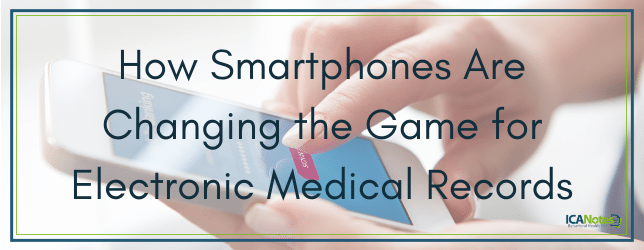How Smartphones Are Changing the Game for Electronic Medical Records
Those of us who are old enough to remember the pre-digital era know that obtaining your medical records at that time could be an extremely difficult proposition. In fact, the only sure way to get them would be to go to your doctor’s office and request them in person. This made the self-management of one’s health a challenge, as most people did not have the necessary data they needed to make the healthiest choices. It also often created anxiety as patients had to wait for their doctor’s appointments to find out about their condition, and they had to try and understand as the doctor explained their records to them — which was not always easy to do.
That has all changed thanks to digital technology. Patient portals and electronic medical records (EMRs) allow patients to gain access to their health records much more quickly and easily. Patients can also reference them whenever they need to and on their own time. Typically, patients access these records using a home computer, but the time for one to access EMRs on a smartphone are close at hand.
Electronic Health Records on Smartphones
Smartphones are ubiquitous in today’s society, and virtually everyone has one close at hand to quickly access the information they need in the world. The portability and ease of use when it comes to smartphones makes the idea of tracking health data on smartphones obvious. Being able to check on important personal health data via smartphone wherever and whenever you are is likely to have highly beneficial effects when it comes to patient care, especially self-care.
Healthcare entities are already committed to improving patient care with smartphones. A survey by the Spyglass Consulting Group found that nine out of 10 healthcare systems intend to invest heavily in smartphones and similar communications over the next year or two. Hospitals are even integrating “hardened” mobile devices, which are smartphones built to stand up to medical environmental conditions like getting exposed to bodily fluids. According to Apple, over 40 hospital systems are using its Health Record feature to allow access to patients’ electronic health records.
The Future of EHR and Smartphones
Electronic health records and smartphones are a natural match, and if you are a behavioral health professional, you should be aware of the benefits of both electronic health records and mobile communications as well. To be ready for the smartphone revolution in patient communication, you will want to have a robust electronic health records system in place already. The most clinically robust behavioral health EHR available is ICANotes.
ICANotes is the only EHR that is fully configured for addiction treatment and behavioral health. It is also easy to use, intuitive and simplifies billing dramatically. The software includes unlimited one-on-one web-based training sessions and free priority access to certified support experts by way of your preferred method of communication. To learn more, call us at 866-847-3590 or sign up for a free trial or live demo now.
Related Posts:
2018 Updates to the EHR Incentive Program
How to Give Patients Access to Their Mental Health Records

